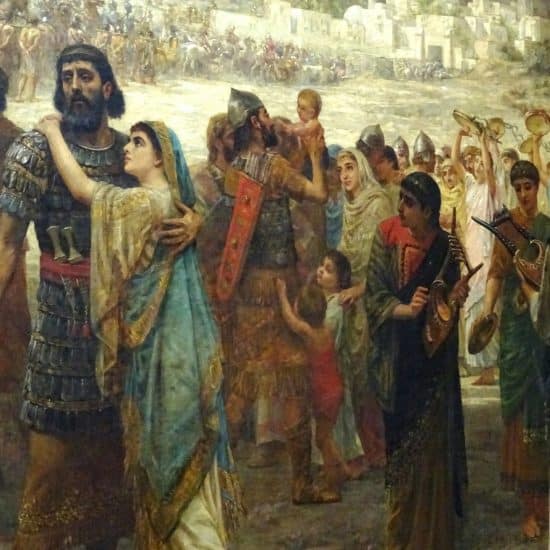 Israel’s failure
Israel’s failure
Formations: July 3, 2016
Scripture: Judges 2:11-23
 Michael OlmstedThe book of Judges (c. 1200-1020 BC) has been referred to as Israel’s “dark ages” because it is marked by idolatry, immorality, cruelty and war. After the death of Joshua, who led the ragtag pilgrims into the Promised Land, there was no significant leader to guide the tribes as they settled into Canaan. Even with the remarkable leadership of Moses and Joshua, the people called Israel still made some terrible blunders. The judges are fascinating individuals who rose up out of chaotic times, led the people spiritually as well as on the battlefield and then faded when Israel was once again stabilized.
Michael OlmstedThe book of Judges (c. 1200-1020 BC) has been referred to as Israel’s “dark ages” because it is marked by idolatry, immorality, cruelty and war. After the death of Joshua, who led the ragtag pilgrims into the Promised Land, there was no significant leader to guide the tribes as they settled into Canaan. Even with the remarkable leadership of Moses and Joshua, the people called Israel still made some terrible blunders. The judges are fascinating individuals who rose up out of chaotic times, led the people spiritually as well as on the battlefield and then faded when Israel was once again stabilized.
We tend to think of Israel as secure in their faith and constantly in touch with memories of God’s great miracles and provisions for them. They were as human as us and living in a time of challenging transition. Most people groups were ruled by a king or powerful military leader, but Israel had no such head. Israel had come from slavery in Egypt, where an abusive government controlled them, followed by years of nomadic wanderings and then the transition to an agricultural lifestyle.
Complicating this new life in Canaan was a long-established religion based on foreign gods who supposedly controlled weather, land, crops and livestock. Baal was worshiped as the god of weather or storms and Ashera (Astarte), his lover, controlled the fertility of the land and changing seasons. Every culture in that day had its own gods. Often those pagan gods ruled over specific land areas. It was common to recognize various deities, depending on established local traditions. So, without clear centralized leadership, and suffering from spiritual memory loss, it was all too easy for Israel to be influenced by the surrounding culture. This is no justification for Israel’s drift from God. Let’s not forget that we also can be influenced by our world and make decisions that lead us away from God.
Judges presents a pattern of Israel’s spiritual failure: the people turn to idolatry, God sends an oppressor to punish them, the people repent, God sends a deliverer, and the people experience a newfound peace. But with the restoration of peace and God’s blessings, the people drift back into idolatry and a repeat of the same tragic cycle (Judges 2:11-19).
It is easy to blame the native Canaanites for Israel’s problems, but the destructive pattern of adopting pagan ideas and practices has its roots in Israel’s failure to heed God’s specific instructions to drive the Canaanites out of the land so Israel would not be tempted to worship foreign gods (Joshua 23:2-13). All that Joshua warned came true.
But God never leaves his people without hope. God allows Israel the freedom to choose. Our text explains: “So the Lord became angry with Israel and said, ‘Because this nation has violated my covenant that I required of their ancestors and hasn’t obeyed me, I in turn will no longer drive out before them any of the nations that Joshua left when he died.’ As a test for Israel, to see whether they would carefully walk in the Lord’s ways just as their ancestors had done, the Lord left these nations instead of driving them out immediately or handing them over to Joshua” (Judges 2:20-23).
So much for the notion that God exempts or protects us from the realities of the world! Faith must go well beyond the secret places of the heart to be deepened and strengthened by the world in which we live. Even Jesus did not walk around with some kind of impenetrable force enclosing him to somehow repulse discomfort or danger. God lavishes his grace upon us and we either choose to live accordingly or exchange that grace for the empty promises of the world. Israel kept on repeating the same mistakes and suffering the consequences.
The judges were colorful individuals, not unlike the colorful heroes of our nation’s earliest days. They were champions who stepped forward, took risks, defended the weak and tried to live by God’s covenant. We view the judges as military leaders, but the biblical language hints at their being “deliverers” or “saviors.” Those judges were far from perfect. Gideon (Judges 8:27) and Jephthah (Judges 11) failed to provide a godly example. Ehud was not trusted because he was left-handed, a cultural taboo. Debra was not trusted because she was a woman. None of the judges had it easy, but God used each of them to help Israel find their way back to God. In every circumstance and with every judge God’s purpose is redemptive, to give Israel a way back to his love and deliverance.
Judges is a book of hope, with repeated stories about God’s children losing their way and God drawing them back. Each story reminds us that Israel will always live in a world with “Canaanites” as their neighbors. What will their choice be: to worship and serve God or the idols of Baal and Ashera? It’s easy to see ourselves and our world in these ancient stories.
As we hear the tragic stories of our world and listen to disturbing political rhetoric of this campaign season, how will we decide to live? Do we withdraw or compromise our witness rather than stand up for truth and sanity? The “Canaanites” are all around us. How can we stand up, speak out, and become the presence of Christ for this broken world?
Is there a pattern or cycle of sin in our lives? Are we so shaped by an unbelieving world that no one even recognizes us as follower of Christ? How are we growing and discovering new insights into faith and what it means to be a Christian today? How are we different from society around us? Are we willing to be different or is the goal to fit in and go unnoticed?
What is your attitude to the world? Do you feel oppressed, ignored, inferior, afraid? Do you feel like God is not interested or sympathetic to your needs? Do you feel that God’s people should be exempt or protected from the problems of life?
There is an alternate perspective repeated throughout the Bible. Jesus displayed that alternative … trust in the God who is love and grace … hope in the God who is our companion in all things … experience life in the God whose Son became one with us, died, arose from the grave, and is with us in every experience until this broke world is concluded!
Retired after 45 years in pastoral ministry, Michael K. Olmsted enjoys family, supply preaching and interim work, literature, history, the arts and antiques.
Formations is a curriculum series from Smyth & Helwys Publishing, Inc. through NextSunday Resources.
The PDF download requires the free Acrobat Reader program. It can be downloaded and installed athttps://get.adobe.com/reader.



